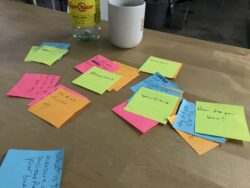There is little question that this pandemic has affected everyone. For these reasons, I recently held a couple public sessions on how we are responding to all this change. This session use the simple rocket retrospective to get a group of like minds together to discuss how the COVID-19 crisis is affecting us as individuals, as small groups and families, and humanity as a whole.
I was very intrigued as a facilitator to learn that we responded to all this change similarly, and yet, there were some distinct differences of how others responded to the change. Here are some things that We learned as a group.
- The first and foremost tasks were centered around safety and survival
- many people experienced stress
- people became more aware of their own habits and the habits of the people around them
- Just about everyone experienced some productivity loss even though the intention was the opposite
- no one knew how to respond at first, however, most people found some middle ground
- everyone seemed to struggle with the change at first
- less experienced individuals, like children, were lost when it came to responding to the change. However, we did our best to help them understand.
- many people and small groups were looking to improve their lives no matter what the situation
Sound familiar? A lot of these habits and behaviors can be seen on agile teams. When we start working on an agile team, we look to what we know first to produce value. I find it interesting that with a pandemic and with new agile teams, the first tasks usually entail some kind of survival. Here are some of the things that we discussed as a group that proves agility works, especially in times of change.
What is going well (our thrust)
- We’re eating better, and finding new ways to get our food and supplies
- we are gathering more often in small groups, like dinners, activities, etc.
- We are seeing the people that are most important to us more often
- We are getting to the tasks that we put off
- We are creating new routines that are more important to us
What is not going well (our gravity)
- financial problems including job loss
- Added stress in every way
- lowered productivity
- old disagreements are suddenly returning
- feeling tide down with activities that we did not anticipate
- children are struggling more than expected
- places of employment were being used as havens from an unsafe household
How can we improve? (how can we get home?)
- Gratitude. There were many expressions of gratitude towards service organizations, toward other family members, and 2 all other groups sense everyone was aware that we were all in this together.
- Letting go of impossible standards. Many people understood that the only things that mattered were the things that were important to us.
- Awareness. this includes awareness of people around us, awareness of the situation, awareness of things we miss that others see, and even something as specific as having emotional checkpoints. This awareness will help us get ahead of the meltdowns.
- Working together as a team . Since everyone is forced to be in one place with one mission, we all find that we must work together to achieve the same goals.
- Find ways to improve our lives, and find ways to improve the lives of those around us that we care about.
A new “sustainability”
You have probably heard the phrase “a new normal” in recent vernacular. I do not like this phrase. Even Virginia Satir described situations like this as “a new status quo”. I’m not sure that this phrase applies here either. My wife put it pretty succinctly as saying is it is “a new stability”. Now I like that. However, I think that the best term that applies here is “a new sustainability”.
What does all this mean? It means that things will not go back to “normal”. Things will never be as they were before this pandemic started. It means that we will experience new habits, we will have more awareness of things before we get started, and we will consider safety earlier in the activities that we perform. It also means that we will improve our lives to know what is valuable, what is not so valuable, and ways that we can get to any even better sustainability.
What now?
If you did not participate in this retrospective, I would love to hear your comments of your journey to obtaining your new sustainability.

